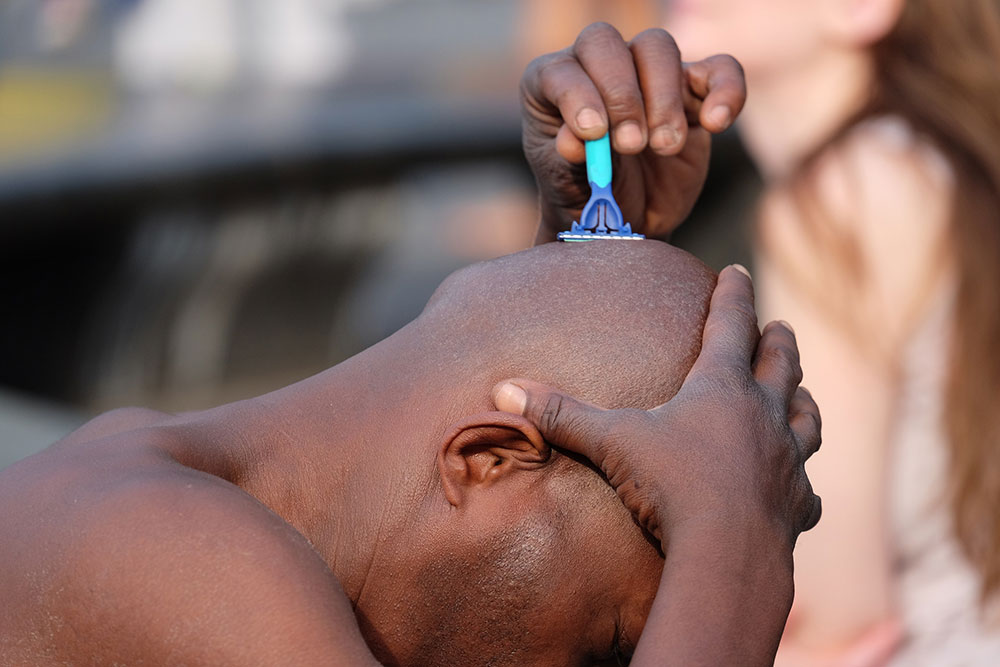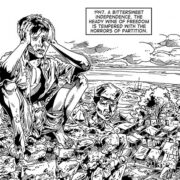My father has been bald for the entirety of the time that I have known him. Modest Bengali mothers like to call their husbands “sunchho”, but my mother endearingly calls my father “takla” [bald man].
His bald patch glistens with sparse hair on the fringes and leaves him utterly conspicuous, like the yolk of a sunny-side-up. We easily follow its lambent glow inside crowded pandals during Durga Pujo or when it is hard to keep pace with him on the streets of Kolkata. When my mother and I wait to receive him at airport lounges, watching the aircraft land we often get impatient for him to emerge from it. Finally spotting him, my mother exclaims in an embarrassingly loud tone, “Oitoh Takla!” When he pleases us with his lectures at seminars, we congratulate him between ourselves, “Takla’s spoken well!”
 Shame, non-acceptance, and exclusion unfailingly accompany baldness.
Shame, non-acceptance, and exclusion unfailingly accompany baldness.The jokes about baldness survived and flourished within our frank and loving relationship. On my father’s side of the family, our humour relied upon our comfort and reconciliation with our “flawed” features. My mother met the standards of conventional beauty, yet she was equally unconcerned about appearance. There was an all-pervading reluctance about the maintenance and pursuit of beauty, though we did occasionally dress presentably and always found each other beautiful. Baba entertained us with his joyous self-mockery. After a “skirmish” with our driver in Kerala, he complained that we must never expect him to sustain an argument against such thick-moustachioed people—the driver had more hair on his moustache than my father did on his head.
That is how fluid and unassuming my father’s masculinity has been—the clean-shaven kind. We have never felt threatened by any beard or moustache in the house. The hyper-masculinity in “No-Shave November” is particularly appalling to me for the very same reason. (But I am somewhat self-critical of my bias against facial hair. Beards do look good and I do know many feminists with moustaches.) Not until I was grown up did I quite realise that baldness was seen as a thing of shame.
* * *
It was funny in some discreet way—I had not begun to deconstruct such funniness yet. We found boys who talked like girls funny, too. Once, when we were little, two of my school friends promised to each other they would return bald the next day. All of us in class assumed that neither of them would dare. As expected, one returned unchanged, but the other had fully shaved off her hair. I couldn’t understand why she was more embarrassed than proud. She had won the challenge, after all. As it turned out, we also had to pose for our class photo that very day. The only two girls with shaved heads in the class were called out of the rows of students on the benches to stand out on either side. What is the price of “standing out”? Do you feel exceptional or excluded? We were taught not to question in school and we non-critically accepted that making them stand out in this way was only an aesthetic necessity.
Shame, non-acceptance, and exclusion unfailingly accompany baldness. I see no other reason why shaving your head is not widely fashionable yet. Nyara bell tolay ek bar-i jay: this Bangla adage is pedalled around as a word of caution against making the same mistake twice. The friend who stood out from the rows of us in neat ponies never shaved her hair again. To ascribe an alternative interpretive meaning to the proverb would be to understand the tragic fate of the bald head. However cautious nyara or takla may become, society will pelt shame and embarrassment at you as soon as you bear a bare head! The only shield against it is confidence and style.
Monolithic gender performance extends even to the haircuts we are persuaded to choose and our shaving habits. Today’s popular standard of masculinity is short hair, which is a wholly Western import. The same societal customs will have a woman grow a healthy, long mane. While tufts of body hair and a vigorous beard attest to masculinity, women are encouraged to spend a fortune waxing body hair and threading upper lips. As children, we laughed hysterically at the most underwhelming jokes. Breaking up the word ‘automatically’ into “auto mein takli” [bald woman in the auto] was a much-applauded joke. Now I wonder why the “takli” in the auto cannot be a gorgeous woman.
* * *
Baldness is ludicrous or even ridiculous to most, making a whole market infested with dermatological treatments, spas, and hair products survive on our lack of confidence and insecurity. There is a men’s website that has issued an article on dealing with baldness. After a few formulaic suggestions of hair transplants and tips to reduce stress, it resigns itself to preaching about building confidence. There is a related article about Donald Trump’s wig. Donald Trump invited women at campaign rallies to pull at his hair and see if he wears a wig. (If Trump does wear a wig, indeed, that’s among the most innocuous things he has done.) The website, usually addressing men’s problems like “How to Build Abs” and “How to fix your sex life”, also ends the article with a manly resolution of “covering up is not what a MAN does”.
While there is some general discomfort around baldness, women are in a more precarious situation here. My neighbour makes desperate trips to the beauty parlour within weeks for her hair transplant and ozone treatment, and simultaneously to wax. Her complaints are about a fast balding head and an unbeatable body hair regrowth rate. Before condemning women who have internalised shame about a receding hairline, we need to be aware of the humiliation they have had to undergo for it. My cousin’s parents raised her to think of her future only in terms of marriage. When she started losing hair, it seemed to signal that her life was over. After meeting rejection after rejection, she received all kinds of hair treatments possible. I have despaired over the conditioning that made her submit to rejection. She told me once it was all good for her to become a strong woman, yet she worried that she would never be loved or desired.
Bald Johnny is a favourite male porn star that Brazzers describes as “a major stud, from head to toe”. Would a bald woman survive in the industry?
The same repressive culture which does not accept a bald woman will not allow her to expose her hair. Hair untied is unbridled female sexuality and power. In the Mahabharata, Draupadi never ties or washes her hair after her public harassment. On the other hand, Western feminism refuses to respect the choice of a Muslim woman when she chooses to cover her head. Orhan Pamuk’s Snow explores the possibility of a feminist subversion within the undeniably patriarchal framework of religion. The story sustains the polemics by making the headscarf its central issue. The coercive State apparatus uses a theatrical medium to propagate liberalism and makes the leader of the “Headscarf girls” in Turkey bare her hair in a performance. But this is received as a triumph of Western secularism against political Islam. Rampant Islamophobia in our minds makes it impossible to conceive that a Muslim woman may exercise her agency in making a decision!
It is appalling how often women’s hair is nourished purely for male desire like Belinda’s locks were in The Rape of the Lock. Alexander Pope eulogises the almighty lock. The formidable locks are hardly empowered, though. Pope also exaggerates a woman’s agency—“Fair tresses man’s imperial race ensnare, and beauty draws us with a single hair.”
* * *
My bald cousin neither experienced desire nor did she marry. Her economic sustenance too was contingent on her “fair tresses”. Then why blame Belinda for her vanity if the power of hair is so irrefutable that it brings one love and marriage? Belinda let her hair loose and resisted the authority that a woman is expected to submit to. Yet, to keep her hair she must remove her ghunghat [veil] only before the husband. And once he dies, her hair must be shaved. Society will not ask her to shave her hair in mourning for her parents as a man does because that will deny her husband the pleasure she “promises”. The rape of her lock will render her female charms impotent. Who shall ever love a bald widow?
We have a peculiar obsession with fertility, pushing “infertile women” onto the stove. Baldness is fertile, too—for humour and style, if nothing else. My grandmother asks me what I am writing about “boldness?” She muddles it up with “baldness”. Yes, the words do have an inescapable, alliterative, onomatopoeic effect.
There is a single bald tree on a little bald mountain peak; its leafless branches twirled around in indignant meaningless shapes. The branches depart from the disciplined grasp of the trunk and emerge like discourses. They are like our conversations, rising in the air like wisps of smoke, uncontrolled in structure and spirit. Baldness has come to be an experience of absence and disempowerment. “Lack” admitted itself into definitions and smothered separateness with inadequacy.
Like the lack of light is darkness,
And the absence of god is the devil,
So the lack of hair is baldness, we have derived.








